初三英语模拟测试卷
初三英语模考考卷

初三英语模考考卷一、听力部分(共30分)1. 听力理解(共15分,每小题1分)(1)听对话,选择正确的答案。
(5分)(2)听短文,判断下列句子是否正确。
(5分)(3)听长对话,回答问题。
(5分)2. 听力填空(共15分,每空1分)根据所听内容,填写下列表格。
二、单项选择(共20分,每小题2分)1. 选择最佳答案。
2. 从A、B、C、D四个选项中,选出画线部分发音不同的单词。
3. 根据句意,选择合适的词语或短语。
4. 选择最佳句型。
三、完形填空(共15分,每空1分)阅读下面的短文,从A、B、C、D四个选项中选出最佳答案。
四、阅读理解(共40分,每小题2分)1. 阅读下列短文,选择正确的答案。
2. 阅读下列短文,根据文章内容,完成表格。
3. 阅读下面的广告,回答问题。
4. 阅读下面的故事,判断下列句子是否正确。
五、词汇运用(共20分,每小题2分)1. 用所给单词的正确形式填空。
2. 根据句意,用括号内所给单词的适当形式填空。
六、句型转换(共10分,每小题2分)按要求改写下列句子。
七、翻译句子(共10分,每小题2分)将下列句子翻译成英语。
八、书面表达(共20分)1. 根据提示,写一篇短文。
(10分)题目:My Favourite Teacher(1)介绍你最喜欢的老师的外貌和性格特点;(2)描述一件这位老师帮助你或给你留下深刻印象的事情;(3)表达你对这位老师的感激之情。
要求:不少于100词,可适当发挥。
(1)介绍你的学校和学习科目;(2)描述你的日常生活;(3)邀请Peter来中国做客,并表示愿意当他的导游。
一、听力部分1. 听力理解(1)15 ACBBD(2)15 TFFFT(3)15 TFFFT2. 听力填空(1)name, age, hob, school, subject(2)weather, sunny, cloudy, windy, rainy二、单项选择1. 15 ACBDA2. 15 BDACC3. 15 DBACB4. 15 DCBAA三、完形填空115 ACBDB CADBA DCBAC四、阅读理解1. 15 BCABA2. 15 ACBBD3. 15 DCBAA4. 15 FFTFF五、词汇运用1. 15 reading, interesting, carefully, fastest, ill2. 15 goes, didn't do, was sleeping, did, didn't have六、句型转换1. Is this your pen?3. Does she like apples?4. They are playing football.七、翻译句子1. What's the weather like today?2. My mother is a teacher.3. I like reading books in my free time.4. We should help each other and study hard.八、书面表达(略)一、听力部分考察学生听力理解、信息捕捉和词汇拼写能力。
中考英语模拟试卷20套
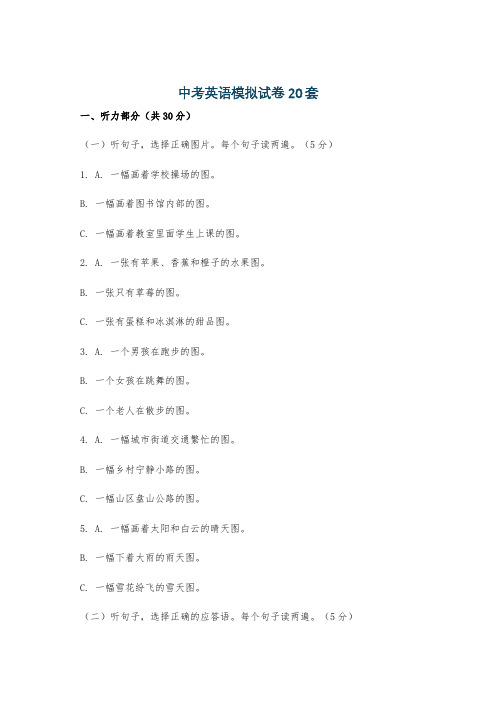
中考英语模拟试卷20套一、听力部分(共30分)(一)听句子,选择正确图片。
每个句子读两遍。
(5分)1. A. 一幅画着学校操场的图。
B. 一幅画着图书馆内部的图。
C. 一幅画着教室里面学生上课的图。
2. A. 一张有苹果、香蕉和橙子的水果图。
B. 一张只有草莓的图。
C. 一张有蛋糕和冰淇淋的甜品图。
3. A. 一个男孩在跑步的图。
B. 一个女孩在跳舞的图。
C. 一个老人在散步的图。
4. A. 一幅城市街道交通繁忙的图。
B. 一幅乡村宁静小路的图。
C. 一幅山区盘山公路的图。
5. A. 一幅画着太阳和白云的晴天图。
B. 一幅下着大雨的雨天图。
C. 一幅雪花纷飞的雪天图。
(二)听句子,选择正确的应答语。
每个句子读两遍。
(5分)1. A. Fine, thank you.B. How do you do?C. Nice to meet you.2. A. It's Monday.B. It's June 10th.C. It's 9 o'clock.3. A. Yes, I can.B. No, I'm not.C. Yes, I do.4. A. I like reading.B. I'm reading a book.C. I read a book yesterday.5. A. By bike.B. For two hours.C. About 5 kilometers.(三)听对话,选择正确答案。
每段对话读两遍。
(10分)1. What does the boy want to be in the future?A. A doctor.B. A teacher.C. An engineer.2. Where are they talking?A. In a library.B. In a bookstore.C. In a classroom.3. How often does the girl go to the English corner?A. Once a week.B. Twice a week.C. Three times a week.4. What's the matter with the man?A. He has a headache.B. He has a toothache.C. He has a stomachache.5. What color does the woman like best?A. Red.B. Blue.C. Green.(四)听短文,根据短文内容完成表格。
初三英语模拟试卷带答案解析
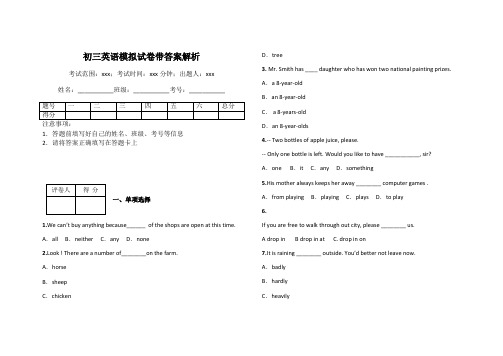
初三英语模拟试卷带答案解析考试范围:xxx ;考试时间:xxx 分钟;出题人:xxx 姓名:___________班级:___________考号:___________1.答题前填写好自己的姓名、班级、考号等信息 2.请将答案正确填写在答题卡上一、单项选择1.We can’t buy anything because______ of the shops are open at this time. A .all B .neither C .any D .none2.Look ! There are a number of________on the farm. A .horse B .sheep C .chickenD .tree3. Mr. Smith has ____ daughter who has won two national painting prizes. A .a 8-year-old B .an 8-year-oldC . a 8-years-oldD .an 8-year-olds4.-- Two bottles of apple juice, please.-- Only one bottle is left. Would you like to have ___________, sir? A .one B .it C .any D .something5.His mother always keeps her away ________ computer games . A .from playing B .playing C .plays D .to play6.If you are free to walk through out city, please ________ us. A drop in B drop in at C. drop in on7.It is raining ________ outside. You’d better not leave now. A .badly B .hardly C .heavilyD.probably8.—Listen! Is it Linda singing in the next room? — No, it __________ be her. She is still in Shanghai.A. can'tB. couldn'tC. may not9.— You used to the bus to school, didn’t you?— Yes, I did. However, I am used to to school now.A.take; walk B.take; walking C.taking; walking D.taking; walk 10.I must you that my patience is almost at an end .A.warn B.warms C.warn to D.warning二、单词拼写根据句意,用括号中所给单词的正确形式填空,每空一至两词。
初三英语模考考卷

初三英语模考考卷一、听力部分(30分)1. 听力理解(共10小题,每小题2分)(1)听下面五段对话,每段对话后有一个问题,从题目的三个选项中选出最佳答案。
(2)听下面一段对话,回答五个问题。
2. 听力填空(共10小题,每小题2分)听下面一段短文,根据短文内容,填写所缺的单词。
二、单选题(30分)1. 词汇辨析(共10小题,每小题2分)从A、B、C、D四个选项中,选出最佳答案。
2. 语法填空(共10小题,每小题2分)从A、B、C、D四个选项中,选出最佳答案。
3. 句子填空(共5小题,每小题2分)从A、B、C、D四个选项中,选出最佳答案。
三、完形填空(20分)阅读下面的短文,从短文后各题所给的A、B、C、D四个选项中,选出最佳答案。
四、阅读理解(40分)阅读下面的短文,然后根据短文内容,回答问题。
Passage 1(15分)Passage 2(15分)Passage 3(10分)五、词汇运用(20分)1. 用所给动词的正确形式填空(共5小题,每小题2分)2. 用所给名词的正确形式填空(共5小题,每小题2分)3. 用所给形容词的正确形式填空(共5小题,每小题2分)4. 用所给副词的正确形式填空(共5小题,每小题2分)六、句型转换(20分)1. 将下列句子改为一般疑问句(共5小题,每小题2分)2. 将下列句子改为否定句(共5小题,每小题2分)3. 将下列句子改为祈使句(共5小题,每小题2分)4. 将下列句子改为反意疑问句(共5小题,每小题2分)七、翻译(20分)1. 将下列句子翻译成英语(共5小题,每小题4分)2. 将下列句子翻译成汉语(共5小题,每小题4分)八、写作(30分)1. 老师的姓名、外貌特征和性格特点;2. 老师的教学方法和课堂氛围;3. 你喜欢这位老师的原因。
一、听力部分1. 听力理解(1)15: BACCA(2)610: CCDBA2. 听力填空(1)(10): example, interesting, however, moment, etc.二、单选题1. 词汇辨析110: BACDB CAACD2. 语法填空110: DCBAC ABDBC3. 句子填空15: ACBDA三、完形填空120: CADAB CBDBA DCDCB四、阅读理解Passage 1115: BABCB DCDCD ACBCAPassage 2115: CBABC ACBDA DCBCAPassage 3110: BDACA CBACB五、词汇运用1. 动词填空15: plays, visiting, is, has done, studying2. 名词填空15: happiness, children, success, freedom, knowledge 3. 形容词填空15: happy, interesting, difficult, famous, beautiful 4. 副词填空15: always, often, rarely, usually, never六、句型转换1. 一般疑问句15: Does she like apples? Do they go to school bus? Canhe speak English? Is your pen red? Does it often rain in your city?2. 否定句15: She doesn't like apples. They don't go to school bus. He can't speak English. Your pen isn't red. It doesn't often rain in your city.3. 祈使句15: Stand up. Don't talk. Be quiet. Open the door. Close the window.4. 反意疑问句15: She likes apples, doesn't she? They go to school bus, don't they? He can speak English, can't he? Your pen is red, isn't it? It often rains in your city, doesn't it?七、翻译1. 英译汉(1)(5):略2. 汉译英(1)(5):略八、写作略基础知识部分:1. 词汇:考查学生对词汇的识记、理解和运用能力。
九年级英语模拟考试试卷及答案

九年级英语模拟考试试卷及答案对于九年级要参加英语模拟考试的学生们,经常做一些英语模拟试卷对于提高英语考试的分数有很大的帮助。
以下是小编给你推荐的九年级英语模拟试卷及答案,希望对你有帮助!九年级英语模拟考试试卷第一部分听力(25分)Ⅰ. 听下面5个句子。
每个句子后有一个小题,从题中所给的A、B、C三个选项中选出作为恰当反应的选项,并标在试卷的相应位置。
听完每个句子后,你都有10 秒钟的时间来回答有关小题和阅读下一小题。
每个句子仅读一遍。
1. A. Black. B. Not at all. C. Sunny.2. A. Three times. B. That’s OK. C. Good idea.3. A. It’s Lucy’s. B. Bill. C. It’s mine.4. A. She’s 12 years old. B. It’s 10:30. C. Today is Sund ay.5. A. No, thanks. B. Yes, please. C. Dumplings.Ⅱ. 听下面5个小对话。
每个对话后有一个小题,从题中所给的A、B、C三个选项中选出最佳选项,并标在试卷的相应位置。
听完每个对话后,你都有10 秒钟的时间来回答有关小题和阅读下一小题。
每个对话仅读一遍。
6. What day is it today?A. Thursday.B. Wednesday.C. Tuesday.7. What’s the woman’s hobby?A. Fishing.B. Swimming.C. Hiking.8. Which sport does Tom like best?A. Volleyball.B. Football.C. Basketball.9. Where are they talking?A. In a bookshop.B. In a restaurant.C. In a clothingshop.10. What is the boy looking for?A. Soccers.B. SocksC. SpoonsⅢ.听下面三段对话。
初三模拟英语试题及答案
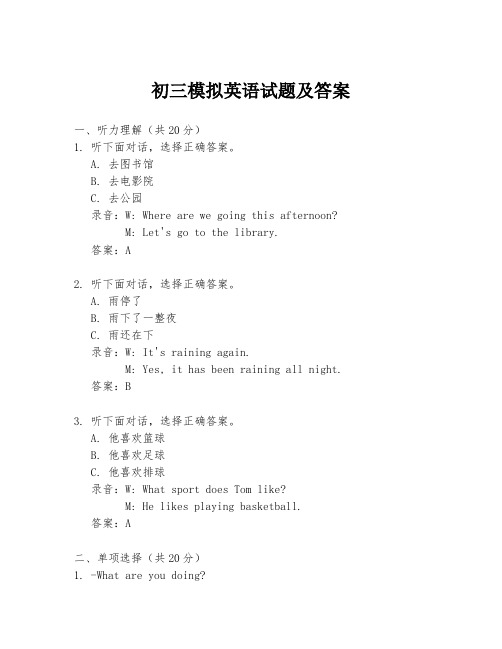
初三模拟英语试题及答案一、听力理解(共20分)1. 听下面对话,选择正确答案。
A. 去图书馆B. 去电影院C. 去公园录音:W: Where are we going this afternoon? M: Let's go to the library.答案:A2. 听下面对话,选择正确答案。
A. 雨停了B. 雨下了一整夜C. 雨还在下录音:W: It's raining again.M: Yes, it has been raining all night.答案:B3. 听下面对话,选择正确答案。
A. 他喜欢篮球B. 他喜欢足球C. 他喜欢排球录音:W: What sport does Tom like?M: He likes playing basketball.答案:A二、单项选择(共20分)1. -What are you doing?-I am ________ my homework.A. doingB. makingC. writing答案:A2. She ________ to school by bus every day.A. goesB. goC. going答案:A3. There ________ some milk and bread on the table.A. isB. areC. have答案:A三、完形填空(共20分)阅读下面的短文,从A、B、C三个选项中选择最佳答案。
In a small village, there was an old man. He was very kind. One day, he found a little dog on the street. The dog was very weak and hungry. The old man took it home and ________ it.A. fedB. feedC. to feed答案:A四、阅读理解(共20分)阅读下面的短文,然后回答1-3题。
九年级英语模考试卷【含答案】
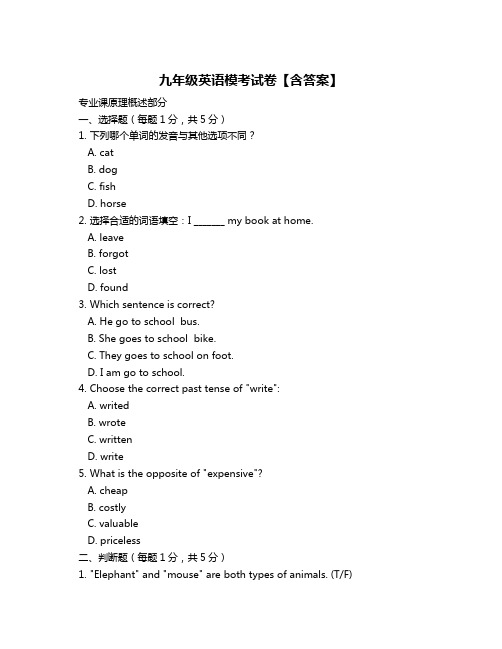
九年级英语模考试卷【含答案】专业课原理概述部分一、选择题(每题1分,共5分)1. 下列哪个单词的发音与其他选项不同?A. catB. dogC. fishD. horse2. 选择合适的词语填空:I _______ my book at home.A. leaveB. forgotC. lostD. found3. Which sentence is correct?A. He go to school bus.B. She goes to school bike.C. They goes to school on foot.D. I am go to school.4. Choose the correct past tense of "write":A. writedB. wroteC. writtenD. write5. What is the opposite of "expensive"?A. cheapB. costlyC. valuableD. priceless二、判断题(每题1分,共5分)1. "Elephant" and "mouse" are both types of animals. (T/F)2. You can say "I am understanding it" to express that you understand something. (T/F)3. "Run" is the past tense of "running". (T/F)4. "He is taller than me" is a correct sentence. (T/F)5. "She didn't went to the party" is the correct way to say she did not attend the party. (T/F)三、填空题(每题1分,共5分)1. If I _______ (be) you, I would not do that.2. They _______ (go) to the park yesterday.3. _______ you like some tea?4. She _______ (read) a book when I called her.5. _______ he play football every weekend?四、简答题(每题2分,共10分)1. What is the difference between "affect" and "effect"?2. Expln the use of "used to" in a sentence.3. What is the past perfect tense and give an example.4. How do you form questions in English?5. What is the difference between "its" and "it's"?五、应用题(每题2分,共10分)1. Translate the following sentence into English: "他昨天晚上在图书馆学习。
初三英语模拟试题与答案
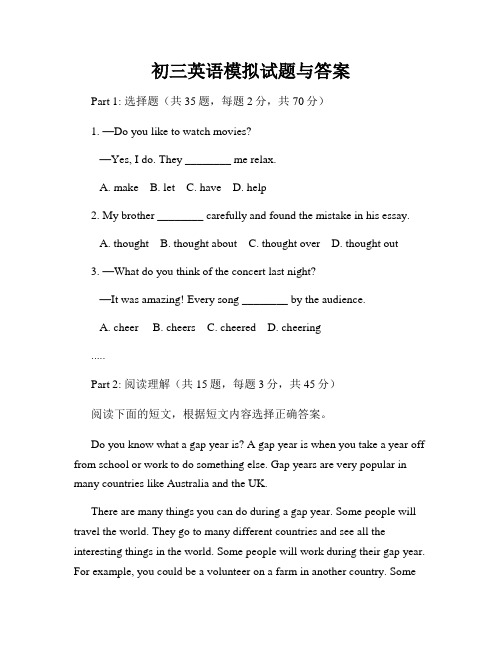
初三英语模拟试题与答案Part 1: 选择题(共35题,每题2分,共70分)1. —Do you like to watch movies?—Yes, I do. They ________ me relax.A. makeB. letC. haveD. help2. My brother ________ carefully and found the mistake in his essay.A. thoughtB. thought aboutC. thought overD. thought out3. —What do you think of the concert last night?—It was amazing! Every song ________ by the audience.A. cheerB. cheersC. cheeredD. cheering.....Part 2: 阅读理解(共15题,每题3分,共45分)阅读下面的短文,根据短文内容选择正确答案。
Do you know what a gap year is? A gap year is when you take a year off from school or work to do something else. Gap years are very popular in many countries like Australia and the UK.There are many things you can do during a gap year. Some people will travel the world. They go to many different countries and see all the interesting things in the world. Some people will work during their gap year. For example, you could be a volunteer on a farm in another country. Somepeople will go to school and learn something new. Many universities and schools offer programs for this.A gap year is good for many reasons. First, it gives you a break from studying. Second, you can get more life experience. When you get back to school or work, you will have more skills. Finally, you can learn more about the world and yourself. You might learn to be more independent, for example......Part 3: 完型填空(共10题,每题2分,共20分)阅读下面的短文,掌握其大意,然后从每小题的四个选项中选出一个最佳答案。
- 1、下载文档前请自行甄别文档内容的完整性,平台不提供额外的编辑、内容补充、找答案等附加服务。
- 2、"仅部分预览"的文档,不可在线预览部分如存在完整性等问题,可反馈申请退款(可完整预览的文档不适用该条件!)。
- 3、如文档侵犯您的权益,请联系客服反馈,我们会尽快为您处理(人工客服工作时间:9:00-18:30)。
初三英语模拟测试卷2013.5第Ⅰ卷选择题(共60分)一、单项选择(本题共15小题;每小题1分,满分15分)( )1. A low-carbon lifestyle has _______ effect on our daily life. People are paying more and more attention to saving _______ energy these days.A. an; theB. a; theC. an; /D. a; /( )2. -—Would you like tea or coffee?—_______ , thanks. I've just had some water.A. EitherB. BothC. NeitherD. None( )3. --- Put away all your things on the desk. There won't be enough _______for my computer.--- OK. I'll do it at once.A. placeB. roomC. areaD. surface( )4. His grade in the exam put him _______ the top students in his class.A. betweenB. overC. amongD. above( )5. --- Listen! David is talking happily with his mother in the next room.--- It ______ be his mother. She has gone to Ya‟an to be a volunteer doctor.A. shouldB. mustC. can‟tD. mustn‟t. ( )6. — Is this microphone _______?— No, it belongs to _______.A. his, hersB. him, hersC. him, herD. his, her( )7. --- What time does the first train to Beijing leave?--- Wait a minute. I'm just_______.A. turning upB. picking upC. catching upD. looking up ( )8. He used to _______ in a village, but now he has been used to _______in the big city.A. live; livingB. live; liveC. living; livingD. living; live( )9. --- How do you like the dishes, Eric?--- Fantastic! They taste _______.A. nicelyB. goodC. terribleD. well( )10. --- Mr Smith, would you please speak a little more_______?--- Sorry. I thought you could follow me.A. loudlyB. slowlyC. clearlyD. politely( )11.A true friend can see the sadness in your eyes _______ everyone else believes the smile on your face.A. whileB. becauseC. beforeD. until( )12.Lily _______ Nantong for 7 years, and now she enjoys the life here very much.A. has come toB. has been toC. has been inD. has gone to ( )13. Now many people were killed in traffic accidents, so safety on the road ________ .A. pays attention toB. will pay attentionC. should be paid attention toD. will be paid attention( )14. Could you tell me _______?A. what is the machine used forB. where was the police stationC. how long you had lived hereD. when you came back( )15. --- Mr Smith, please teach me how to draw on the computer today.--- Oh, no._______. You have to get familiar with the keyboard first.A. Learn to walk before you runB. It's never too old to learnC.A good beginning is half doneD. The early bird catches the worm二、完形填空(本题共15小题;每小题1分,满分15分)Christmas was coming and my ten-year-old Alice told her father and me that she wanted a new bike. Her bike was too 16 , and it needed repairing as well.As Christmas 17 , her dream for a bike seemed to disappear, we thought, for she didn't say it again. We were busy 18 some beautiful story books, a doll house, a holiday dress and toys. Then to our surprise, on December 24, she said she really wanted a bike more than 19 .Now we didn't know 20 to do. It was just too late. We were busy with Christmas dinner and packing 21 presents, parents' presents, a brother's present and friends' presents till midnight. So there was 22 time to take to buy the "right hike" for our little girl. Thinking we were parents who would make their child unhappy, we felt sorry and 23 .Suddenly my husband had an idea. "What about making a little bike with clay (黏土) and writing a note that she could trade in (交换) the model bike for a real one?" So he spent the next five hours carefully __24__ with clay to make a small bike.25 Christmas morning, we were so excited for Alice to open the little box with the beautiful red and white clay bike and the note. She opened and read the 26 loudly. She looked at me and said, "So, does this mean I can trade in this bike for a real 27 _?" Smiling, I said, "Yes!" Alice had tears in her eyes when she replied, "I would 28 trade in this beautiful bike Daddy made me. I __29 _ keep it than get a real bike. This is the best Christmas present 30 I have ever got in my life!" ( )16. A. new B. old C. beautiful D. modern( )17. A. came nearer B. was over C. went by D. passed( )18. A. buy B. bought C. to buy D. buying( )19. A. something else B. anything else C. else something D. else anything ( )20. A. what B. how C. why D. where( )21. A. children B. children's C. boy D. girls( )22. A. enough B. no C. much D. still a little( )23. A. happy B. excited C. sad D. angry( )24. A. works B. worked C. working D. to work( )25. A. In B. On C. At D. For( )26. A. book B. story C. note D. newspaper( )27. A. one B. ones C. some D. any( )28. A. usually B. certainly C. never D. of course( )29. A. am going to B. would like to C. had better D. would rather( )30. A. who B. those C. what D. that三、阅读理解 (本题共15小题;每小题2分,满分30分)ATell your car to make a phone call without holding the phone. Tell your car to send an e-mail without touching the computer. Or even tell your car to send a call for help. Sound like something from a science fiction movie. Well, thanks to a new “talking car”, this is soon to become reality.Road Track, the Israeli(以色列的)producer of Chevrolet(雪佛莱), has built a computer platform called Chevy Star. It offers the driver a wide range(范围)of things you can get with your voice.It uses a box the size of a mobile phone attached to(贴到)the rear view mirror(后视镜). The driver can use it to be in touch with Road Track‟s Offices. Many operators(接线员)work round-the-clock so as to answer the phone and the needs of drivers.To get into the car, the driver has to say a secret code, such as “Open Sesame(芝麻开门)”, for the doors to open and the engine to start. Upon entering the car, the driver has three buttons: one for emergencies(紧急事故), another for telephone calls and a third for practical information. When the driver presses the emergency button, the operator calls the car to ask if there is a problem. If the driver is lost, the operator can use a map to help the driver to find his or her way. “It depends 100 percent on the voice, so you don‟t have to take your eyes off the road or hands off the wheel to use it. You just speak out and then the operator gives you instructions,” said Danny Laguna of Chevrolet. The operator is also alerted(警惕的)when the driver hits the brake(刹车器)too hard. And if operators find a problem anywhere on the car, they warn the driver straight away. Need to make a phone call? Just press the button and read out the number to dial. E-mail can also be dictated(口授). The driver also has many practical things to choose from: the weather, the latest world or local news, what‟s on at the cinema or theatre.31. How many buttons are there in the car?A. One.B. Two.C. Three.D. Four.32. If the driver is lost, he or she should ________________.A. press the emergency buttonB. press the telephone call numberC. press the practical information buttonD. hit the brake too hard33. To get into the car, the driver has to __________________.A. press the practical informationB. say a secret codeC. open the door of the carD. ask for help34. Press the practical information button to get ________________.A. the help from the operatorsB. the latest world or local newsC. a phone callD. the door closedBThis is a chart of a car‟s fuel consumption during a certain day.Time of todayFuel consumption—燃料消耗petrol—汽油litre—升35. The above chart shows ______________.A. how much petrol was needed to fill the tankB. the speed the car was goingC. which trip used the most petrolD. how far the car traveled36. The driver bought petrol at ________________.A. 8 a.m.B. 9 a.m.C. 4 p.m.D. 6 p.m.37. Throughout the day the car used ________________.A. 45 litres of petrolB. 40 litres of petrolC. 35 litres of petrolD. 10 litres of petrolCPeople are always afraid of making mistakes. But sometimes it‟s not bad to make mistakes, and here is why.At first, mistakes are a clear sign that you are trying new things. It‟s always good to try new things, because when you are trying new things you are growing. If you never try new things, how can you improve? How can you create? The simple answer is, …You can‟t.‟ Look around you, everything you see is the result of someone trying new things.Another good thing about mistakes is this: When you are making mistakes, you are learning. Consider this: Edison failed 10,000times before he invented the light bulb. When he was asked how he felt to fail that many times, he said that he hadn‟t failed 10,000times, but rather had learned 10,000things that didn‟t work.Finally, when you make a mistake, you are that much closer to success. Why? Because you have said what you should say, and you have done what you should do. Every time you make a mistake, you are closer to success. But it doesn‟t mean that you can make mistakes without thinking. Instead, when you try new things you have to think them over, so that you can keep away from some unnecessary mistakes.38. If you are making a mistake, that means_________.A. you‟re carefulB. you‟re kindC. you‟re growingD. you know nothing39.After Edison failed 10,000 times, he________.A. gave upB. invented the light bulbC. invented the computerD. invented 10,000 new things40. When you make a mistake, you are closer to __________.A. timeB. moneyC. successD. everything41. What‟s the main idea of the passage?A. Never make mistakes.B. You can make mistakes without thinking.C. Sometimes it‟s good to make mistakes.D. Making mistakes is terrible.DNever go into a supermarket hungry! This is a good piece of advice. If you go shopping for food before lunchtime, you‟ll probably buy more than you plan to. Unfortunately, however, just this advice isn‟t enough for consumers(消费者)these days. Modern shoppers need an education in how and how not to buy things at the store. First, you check the weekly newspaper ads. Find out the items(商品)that are on sale and decide if you really need these things. In other words, don‟t buy anythi ng just because it‟s cheaper than usual! “New and Improved!” or “All Natural” on the front of a package influence you. Instead, read the list of ingredients(成分)on the back. Then compare prices; that is, you should examine the prices of both different brands(品牌)and different sizes of the same brand.Another suggestion for consumers is to buy ordinary items instead of famous brands. Ordinary items in supermarkets come in plain packages. These products are cheaper because producers don‟t spend much money on packing or advertising. The quality, however, is usually as good as the quality of well-known name brands. In the same way, in buying clothes, you can often find high quality and low prices in brands that are not famous. Shopping in discount(折扣)clothing stores can help you save a lot of money. Although these stores aren‟t very attractive, and they usually do not have individual dressing rooms, not only are the prices low, but you can often find the same famous brands that you find in high-priced department stores.Wise consumers read magazine ads and watch TV commercials(广告), but they do this with one advantage: knowledge of the psychology(心理学)behind the ads. In other words, well-informed consumers watch for information and check for misinformation. They ask themselves questions: Is the advertiser hiding something in small print at the bottom of the page? Is there any real information in the commercial, or is the advertiser simply showing an attractive image? With the answers to these questions, consumers can make a wise choice.42. Why does the writer suggest that you sho uldn‟t go into a supermarket hungry?A. Because you may buy more than you plan to.B. Because you may feel tired.C. Because you may forget to buy enough things.D. Because you may lose your way.43. Before you decide to buy things, you should _____.A. make sure whether they are on saleB. consider if you really need themC. examine the prices of different brandsD. read the words on the front of the package44. The writer suggests consumers buy ordinary products because _____.A. they come in plain packagesB. they are advertised on newspapersC. they are both good and cheaperD. the quality is better than that of famous ones45. The main idea of the last paragraph is that _____.A. ads and commercials sometimes tell liesB. advertisers sometimes hide some informationC. good consumers never read ads and commercialsD. we should make good use of ads and commercials第II卷(非选择题共60分)四、词汇(本题共15小题;每小题1分,满分15分)A.请根据句意或中文提示、英文释义,写出句中所缺单词,使句子通顺。
